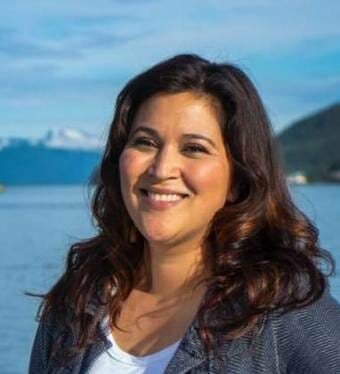- District 1 Assembly
- Troy Wuyts-Smith
- Barbara 'Wáahlaal Gíidaak Blake
- Paul Kelly
- District 2 Assembly
- Kelly Fishler
- Michelle Bonnet Hale
- Mayor
- Beth Weldon
- School Board
- Kyle Scholl*
- Thom Buzard
- Will Muldoon*
- Ibn Bailey
- Aaron Spratt
- Elizabeth Siddon
- Amber Frommherz
Age
39
Family
Engaged; mother of a 15-year-old boy and a 7-year-old foster daughter for the last four years. Parents live here, plus extended family.
Politically, how do you identify?
Nonpartisan
How do you earn a living?
Director of the Alaska Native Policy Center with First Alaskans Institute, member of Sealaska Corp. board of directors
What are some topics you’re an expert on?
Tribal governance, fish and game policy, economic development, being a mom and being an Alaska Native woman

Why are you running for office?
I’ve been asked a few times. And with Loren (Jones) stepping down, just felt like was the right time. There’s definitely a lack of diversity on the board. And I’d like to remedy that with a worldview of perspective as a mother, as an Alaskan Native woman and also someone who has experience with federal, state and tribal government to help bridge some of the gaps that are missing in our current makeup.
COVID-19
Regarding COVID-19, at what point, or under what conditions do you think Juneau should fully reopen?
I don’t think we should consider fully reopening until we are at zero number of cases on a daily basis, and it needs to be steady for at least a month. We have so many precious people here in Juneau, our elders, our youth, those who are aren’t able to be vaccinated because of their age. I want to see that continue. I want to see our school continue, but I don’t think we should reopen until everybody’s safe.
Economy
Do you think the pace of development and economic growth in Juneau is too fast, too slow or about right? Why?
I think we’re about right, in terms of the pace of development here in Juneau. I know that a lot of our development is slowed, our economic development is slowed by the lack of land here. I think a second crossing might help open up some of those opportunities. But in terms of how I see Juneau, you know, we’re a small, big city, for Alaska. And I’d like us to remain so but I appreciate everything we get.
Working together
What’s your approach for dealing with colleagues you disagree with on policy matters?
I worked in the governor’s administration, Gov. Walker, and he came to the table priorly being a Republican and then Lt. Gov. Mallott was a Democrat. And not everybody I worked with had the same view of the world that I did or what policy fix needed to be made. But we found an opportunity to work together. I think, listening deeply, listening to really understand a different perspective. And also talking in a way to help people understand is very helpful.
Hazard mitigation
City-hired experts produced new hazard maps for avalanches and landslides — how should the city balance responsible development with the needs of community members already living there?
I think in terms of safety, we really have to think about the second crossing, you know, as as an alternative route for folks to be able to escape something, a huge catastrophe that could impact a lot of our community members. I think, in terms of economic growth, housing shortages and just public safety at large, when it comes to catastrophes the second crossing is an excellent solution to help with a lot of mitigating of those, those factors in Juneau.
Serving Juneau
Which parts of Juneau do you think are underserved by the city administration and what will you do about it?
I think we’ve had a lack of communication between our Native community, our BIPOC community and our Assembly. And also just a lack of folks who are engaged in that space. I think it’s worth digging a little deeper, you know, we have a systemic racism review committee. And as I see it, it should be thinking more about the system as a whole and thinking about the way that our government functions and is preventing folks from being at the table.